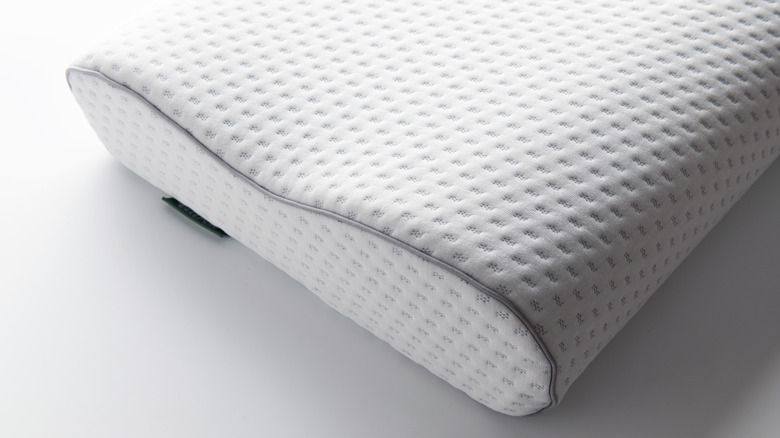How Often You Should Replace Your Pillows For A Better Night's Sleep
When you think of quality sleep, the first things that probably pop into your mind are dim lights, a noiseless ambiance, and a comfortable mattress. But do you know that your pillow plays a big role as well? You've been told that you need to swap out your pillowcases at least once a week because you don't want to be sleeping in accumulated dead skin cells, sweat, drool, hair, dust mites, and facial or hair oils. However, much like with the pillowcase, this can become a concern with pillows, too.
A lot of what gets on the pillowcase can find its way to a pillow and cause allergic reactions and even skin conditions in people with sensitive skin if they never change their pillow, per Sleep Foundation. Sure, you can wash your pillow (if it says so on the label) every few months and ensure some level of cleanliness, but it's equally important to replace pillows, especially if they're stained, smell bad, or have become saggy and aren't offering the support you need for a better night's sleep.
According to most sleep experts, you should be replacing your pillows every two years at least, and sometimes more or less, depending on the quality and make of the pillow.
Memory foam and latex pillows can be replaced every three years
In addition to how much support they offer and what materials they're made of, different kinds of pillows also come with different lifetimes, so to speak.
Per Sleep Foundation, memory foam and polyfoam pillows need to be replaced every 2-3 years; down and feather every 1-3 years; latex every 2-4 years; and the least durable, polyester pillows, should be replaced every 6 months to 2 years. Each kind comes with their own instructions for how you should be washing them (or not washing them) to ensure cleanliness between the periods of replacement. If you're worried about throwing away pillows, you can find ways to repurpose them. Old pillows can make good floor-seating options for when friends come over. Just dress them up in your favorite printed materials.
"The right pillow is essential to keeping your head/neck/spine in proper alignment as you sleep. An old pillow, or even the wrong pillow, can impact how well and how long you sleep at night, and a tired, worn-out pillow no longer provides the appropriate support to your head and neck, impacting your sleep quality," explained Mary Helen Rogers, vice president of marketing and communication for the International Sleep Products Association and member of the Better Sleep Council (via TIME). Now that you know how often you should be replacing pillows, you might be wondering about the best kind of pillow to purchase.
Your sleeping position could give you some clues
According to doctor of physical therapy Staci Hildebrandt (per TIME), finding the perfect pillow for you might involve some introspection about your needs. There is no one-size-fits-all answer. "Rubber and spring pillows do have better performance than feather pillows, but the research is inconclusive on one being more optimal for neck or back pain," she added.
Instructor Rebecca Robbins of Harvard Medical School and the Brigham and Women's Hospital shared (via TODAY) that your sleeping positions could give you some clues. Side sleepers might benefit from having more voluminous pillows. "If you imagine lying on your side, your shoulder will somewhat get compressed into the mattress, but you're still supporting your brain and the space between your head on the pillow and your shoulder, and so that actually is quite a big space," explained Robbins. Back sleepers might find a better fit with pillows that offer a concave area in the center, while stomach sleepers likely require the least amount of support. Thin pillows will be sufficient for them, according to Robbins.
If you suspect that your pillow is causing chronic neck pain that's disrupting your sleep or you wake up every morning with allergies from dust mites, it might be time to take a trip to the store and pick up a new one. Your skin, body, and mind will thank you for it.



